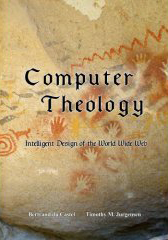PRESS
 |
COMPUTER THEOLOGY |
||||
Begin
at the beginning and go on till you come to the end: then stop.
The
King in
We
hold these truths to be self-evident, that all men are created equal, that they
are endowed by their Creator with certain unalienable Rights, that among these
are Life,
From the Declaration of
These seminal
words of the social order of the United States of America provide a rare direct
illustration of an evolutionary event known as speciation; the creation of new species from old. From these words,
we can begin to draw parallels between biological processes and social order.
The Declaration of Independence is grounded in the metaphorical understanding
from which is derived context sensitive communication. Consider that a mere 15
years after it was published, a subsequent defining document of the social
order, the Constitution of the United States of America prescribed that men
were significantly superior to women and that black men or women were
distinctly less than equal to either white men or women. Women of any hue were
not allowed to participate in the governance so divined and black people of any
gender were declared worth three fifths of a person for purposes of
establishing participatory power within this governance structure. Otherwise,
they could be property owned and traded as chattel goods. The words “equal” and
“Rights” were metaphors meshed in the social interactions of the time. That one
could look upon these words and derive from them something other than gender
independent suffrage, and in particular could draw from them an acceptance of
human slavery, is critically foreign to our current mores. Such is the
double-edged sword instilled in metaphorical understanding. As the 42nd President of the
Computers are complex tools of the human species. To make them work well for us, we have to specify their actions in very great detail. When properly instructed, networks of computers take on the trappings of human social orders derived from the physiological characteristics and capabilities of our species. To create a social order, we engage in grouping mechanisms through which the actions of the individuals within the group are influenced. From a technical perspective, such grouping mechanisms form the trust environments within which we can effect policy. Historically, the most comprehensive such environments have been formed by religions. Within a |
||||
|
||||
© Midori Press, LLC, 2008. All rights reserved for all countries. (Inquiries) The contents of ComputerTheology: Intelligent Design of the World Wide Web are presented for the sole purpose of on-line reading to allow the reader to determine whether to purchase the book. Reproduction and other derivative works are expressly forbidden without the written consent of Midori Press. Legal deposit with the US Library of Congress 1-33735636, 2007.
|
ComputerTheology Intelligent Design of the World Wide Web Bertrand du Castel and Timothy M. Jurgensen Midori Press, Austin Texas 1st Edition 2008 (468 pp) ISBN 0-9801821-1-5 |
Book available at Midori Press (regular) |